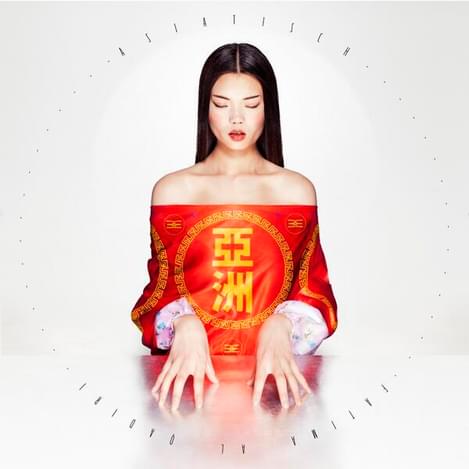"Asiatisch"

Out of all the members though, Fatima Al Qadiri is the one making the most interesting, immersive music. She’s recorded a tribute to the Islamic traditional songs of her youth as Ayshay, a record of beautiful loops and layering that revealed Al Qadiri to have a sweet falsetto despite the treatments she gave it, and followed this up with two EPs; Genre-Specific Xperience drew from new age electronic music while Desert Strike was an often tense affair in which Al Qadiri created a brutal sci-fi world, featuring her now familiar minimal bass and beats, from the dual experiences of being in Kuwait during the first Gulf War and then playing video games based on the war only a year or so later. For her debut album proper Asiatisch, Qadiri continues to draw from her dual Kuwaiti/US upbringing and has created a world and an album that addresses an imagined China and Western perceptions of that country with particular reference to popular culture.
While the two EPs did a fine job of creating proto-worlds, Asiatisch goes one step further and creates an instantly recognisable world filled with the motifs of Asian culture that surrounds us in everyday life; take “Dragon Tattoo” which appears just after the halfway point on the record. Al Qadiri crafts a subtle R&B track from stuttering percussion and synth pads, and eerie Eastern wind instruments, before twisting the terribly racist lyrics (and music) from Lady and the Tramp’s “We Are Siamese” into something new and quite haunting. She sings “I got a dragon tattoo on my arm/and I mean to cause you harm/speak Chinese if you please me/speak Chinese if you please” and it plays on our preconceived stereotypes: why is a dragon tattoo a sign of danger or potential harm in film and art? When did we get to the point where it seems acceptable to have horrific Asian stereotypes as characters in sitcoms (I’m thinking 2 Broke Girls and Dads as obvious culprits)?
Second track “Szechuan” does something similar simply with its name before we even get to the music: by taking the colonial name for the region it’s saying something about authenticity – Al Qadiri hasn’t been to China so she’s taking us to the China she knows by, and through, western culture. The track is tense and full of foreboding, with a skeletal drum and bass beat, electronics that buzz and squelch while Eastern chimes and wordless vocals fade in and out. “Wudan” uses a similar sparse beat but adds a sample of a Chinese traditional poem to the mix. The song’s melody is beautiful and addictive, and the poem carries an element of the unknowable to create an experience that seems normal – mundane, even – yet otherworldly.
Throughout Asiatisch there’s a constant motif of wind instruments, chimes and traditional chanting – you can hear it best on the stirring “Shenzhen” – and this is how Al Qadiri succeeds in tying together her ideas about this imagined China that’s somehow replaced the real country in our minds, especially for those of us who haven’t visited. The repetitive use of the same instrumentation makes the album completely cohesive.
There’s a wonderful moment towards the end of the album, on “Shanghai Freeway” where the beats get more intense, the chimes transform into footwork breaks, the synth horns get Burial creepy and we can hear vividly how Al Qadiri (she describes herself as Asian: “I am Asian. Kuwait is in Asia. But it’s also not”) and other musicians have absorbed these influences: we’re listening to an imagined world inspired by another imagined world. The ambition is staggering and for Fatima Al Qadiri to have made Asiatisch both a coherent listen and a sensible comment on western perception it means we’ve not only got a talented musician on our hands but also an extremely wise cultural commentator. I think you’ll agree that’s a pretty rare and powerful combination.
Get the Best Fit take on the week in music direct to your inbox every Friday

Lorde
Virgin

OSKA
Refined Believer

Tropical F*ck Storm
Fairyland Codex





